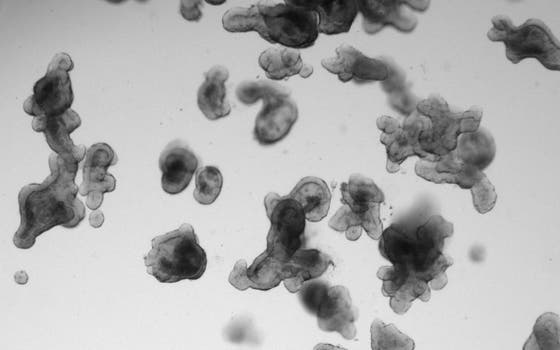'Live' measurements of cell signals show need for combination therapy in colorectal cancer

The team of Oncode Investigator Hugo Snippert (UMC Utrecht) has succeeded in using organoid technology to monitor live how a colon tumor responds to a combination therapy. The results appear in the leading journal Nature Cell Biology on April 1 and offer many leads for follow-up research. Colorectal cancer is a disease that kills more than 4,800 people in the Netherlands each year.
Smart combination
Treating colorectal tumors with the common mutations in the KRAS/BRAF genes requires a combination of different drugs. In 2012, Oncode Investigator Rene Bernards (NKI) showed for the first time that inhibiting multiple components of cellular signaling pathways is necessary for effective treatment of this type of tumor. However, until now it was still unclear at the molecular level why this combination therapy is necessary. With organoid technology developed in the lab of Oncode Investigator Hans Clevers (Hubrecht Institute), mini-tumors have been grown from patient material in which the effect of drugs on the behavior of tumor cells can be measured using new methods. This has made it possible to very precisely measure the activity of the signaling pathways by which the cells communicate with each other.
"We knew that these types of tumors mainly respond to a combination of drugs, but not exactly why," Hugo explains. "With funding from Oncode, we were able to invest in developing a very sensitive and precise measurement system: a microscopic technique that allows us to zoom in on individual cells and also to film over time how well these cells respond to treatments." Using the mini-tumors, the team found that inhibiting signaling pathways in cells did not happen with a single therapy, but required a combination. "This is because we need to dampen these signaling pathways much harder than thought, and than we could measure before. Thanks to our precise measurement method, we now understand that there is a self-reinforcing mechanism in the signaling pathway and that you therefore have to push more than one button to sufficiently inhibit the sometimes complex signaling pathways to fight the tumor," said Bas Ponsioen, principal investigator on the project.
Building on years of expertise
The work of Hugo Snippert and his team shows that Oncode's funding and collaboration model works. "The best research happens in freedom. With Oncode's base funding, it was possible to conduct such high risk/high gain research. Science is also teamwork," Hugo adds. "Our research builds on the insights of colleagues such as Rene Bernards, Hans Bos and Hans Clevers." Initiatives like Oncode bring forward a new generation of researchers who can build on the high level of cancer research in the Netherlands in the years to come. "These results offer my lab many new opportunities. With this system, in collaboration with various partners, we can find out which cells don't respond to treatments at all, why they don't, and whether alternative treatment combinations would be effective." Ultimately, these steps lie at the heart of better treatments for colorectal cancer, a disease that kills more than 4,800 people in the Netherlands each year.
About Oncode Institute
Oncode Institute unites more than 800 excellent fundamental cancer researchers in the Netherlands. Our mission is to stimulate innovations in the diagnosis and treatment of cancer. The ultimate goal is to help patients survive, improve the quality of life for those affected and contribute to a more affordable healthcare system. Oncode Institute translates fundamental insights into the biology of cancer into new diagnostics, new drugs and innovative treatments. Oncode's three strategic pillars to improve patient outcomes are Excellent Science, Collaboration and Valorization. Oncode is funded by KWF, together with the Ministries of Economic Affairs & Climate, Education Culture & Science and Health, Welfare & Sport, and Health~Holland, with a total amount of €120 million until 2022.
